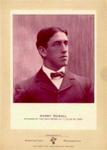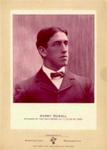September 23, 1901: Brooklyn Superbas treat Reds to a swatting festival in 25-6 win
 On the day in 1901 that a former Brooklyn Superbas pitcher, Dr. James McJames, passed away, the team trounced the Cincinnati Reds, 25-6. McJames had made his name with the splendid Baltimore Orioles of the late nineteenth century. Pitching for the Orioles in 1898, he posted his best record: 27 victories, 40 complete games, a 2.36 ERA, and 178 strikeouts.
On the day in 1901 that a former Brooklyn Superbas pitcher, Dr. James McJames, passed away, the team trounced the Cincinnati Reds, 25-6. McJames had made his name with the splendid Baltimore Orioles of the late nineteenth century. Pitching for the Orioles in 1898, he posted his best record: 27 victories, 40 complete games, a 2.36 ERA, and 178 strikeouts.
While tragedy was taking place, the Reds set a team record for runs allowed with 25,1 and put another nail in the coffin of their 1901 season. The loss added to a long list of failures against the Superbas over the past two seasons, which saw the Reds drop 29 of 39 games they played.2
The “swatting festival”3 included three home runs, four doubles, and a total of 39 bases. Two of the home runs were grand slams and in one inning the Superbas got 12 hits. Brooklyn was still hanging on to a thin hope of catching Pittsburgh for the National League pennant, while the Reds were languishing in the cellar with no chance but to wait till next year.
Leading the barrage at the plate for the Superbas was mustachioed Tom Daly, who went 5-for-6. Daly finished the season with a .315 batting average and led the National League with 38 doubles. Jay Hughes, the third man in Brooklyn’s rotation, racked up four singles. While Joe Kelley, the former “Kingpin of the Orioles,”4 and one-quarter of the “Big Four” (the others being John McGraw, Willie Keeler, and Hughie Jennings) of the spectacular Baltimore teams of the mid-1890s, hit two home runs and a single. Rounding out the attack was Jimmy Sheckard with a grand slam and a safety squeeze. Sheckard was having a career year and wound up leading the National League in slugging (.534) and triples (19). He finished third in the league in batting average (.354), second in home runs (11) and total bases (296), third in hits (196), and third (tied) in runs batted in (104). On top of this hypothetical MVP year – the award didn’t exist at the time –he became the first player of the twentieth century to hit two grand slams in a season. This game’s grand slam was his first, and he hit his second the next day against the Reds.
The Superbas broke the game wide open in the fifth inning, with 16 batters facing Archie Stimmel, the starting pitcher for the Reds. Of the 16 batters, 11 scored, and after giving up 18 runs in the first five innings, Stimmel was pulled for Jack Sutthoff. Sunny Jack, as he was known for his pleasant disposition, was having a disappointing season with the Reds, eventually winding up with a 1-6 record in 10 starts and a 5.50 ERA. He didn’t fare much better than Stimmel, allowing seven runs in the next two innings before finally settling into a groove and setting the Superbas down in order in the eighth and ninth.
On the hill for the Superbas, Jimmy Hughes had a rough beginning to the day, giving up “two runs on three bunts” and a throwing error by Hughes when first baseman Joe Kelley failed to cover the base.5 After the first inning, Hughes settled down until the eighth. Starting in that inning, “Hughes stood in the box … and informed the batters … the exact style of the ball he intended to deliver.”6 If not for the information offered to the Cincinnati batters, Hughes might have finished the contest giving up only two earned runs.
Even with the 34 hits and four walks in the game, it was played in an even two hours. The attendance was reported as 900.7
The Cincinnati Enquirer’s report on the game ran under the one-word headline “Carnage.” The reporter suggested that few “could look at the slaughter without a shudder.”8 The Dayton Daily News likened to scene to “a slaughter pen, with Red blood strewn all over the field.” The paper suggested that Brooklyn “got so awful tired of slugging the ball that they were compelled to stop from sheer exhaustion of wielding the bat and running around the bases.”9
The Reds committed five errors to the Superbas’ three.
The Superbas finished the season in third place in the National League behind the Pirates and Phillies. After two consecutive National League championships this was a disappointing finish, which might be blamed on losing some players to the newly formed American League. The Reds finished the season in last place (eighth), and continued their string of bad seasons. Bad Bill Dahlen, Brooklyn’s shortstop, had a theory as to why the Reds were so ghastly. According to SABR author Lyle Spatz, “He blamed it on their home park, League Park, which had an all-dirt infield. Not only was the all-dirt infield hard on the eyes, said Bill, but it reflected the heat in the summer, thereby tiring out the Reds players.”10 Whether it was because of League Park, or because of the Superbas clinging to a hope of catching the Pirates, this game was truly a “swatting festival” of the highest order.
Sources
In addition to the sources cited in the Notes, the author consulted Baseball-Reference.com, the SABR Biography Project, and the following:
Russo, Frank. The Cooperstown Chronicles (New York: Rowman & Littlefield, 2011).
Thanks to SABR members Stephen S. Eberly and Jim Farmer for assistance providing Ohio newspapers.
Notes
1 Mike Shannon, The Good, The Bad, & The Ugly (Chicago: Triumph Books, 2008), 48.
2 Lyle Spatz, Bad Bill Dahlen (Jefferson, North Carolina: McFarland, 2004), 97.
3 “Reds Buried Under Avalanche of Runs,” Brooklyn Daily Eagle, September 24, 1901: 15.
4 Jimmy Keenan, “Joe Kelley,” SABR BioProject, at https://sabr.org/bioproj/person/17b00755
5 Keenan.
6 Keenan.
7 “Bridegrooms Fattened Their Batting Averages at Expense of Remnants,” St. Louis Republic, September 24, 1901: 8.
8 “Carnage,” Cincinnati Enquirer, September 24, 1901.
9 “Reds Gave Up in Despair,” Dayton Daily News, September 24, 1901: 3.
10 Spatz.
Additional Stats
Brooklyn Superbas 25
Cincinnati Reds 6
League Park
Cincinnati, OH
Box Score + PBP:
Corrections? Additions?
If you can help us improve this game story, contact us.


